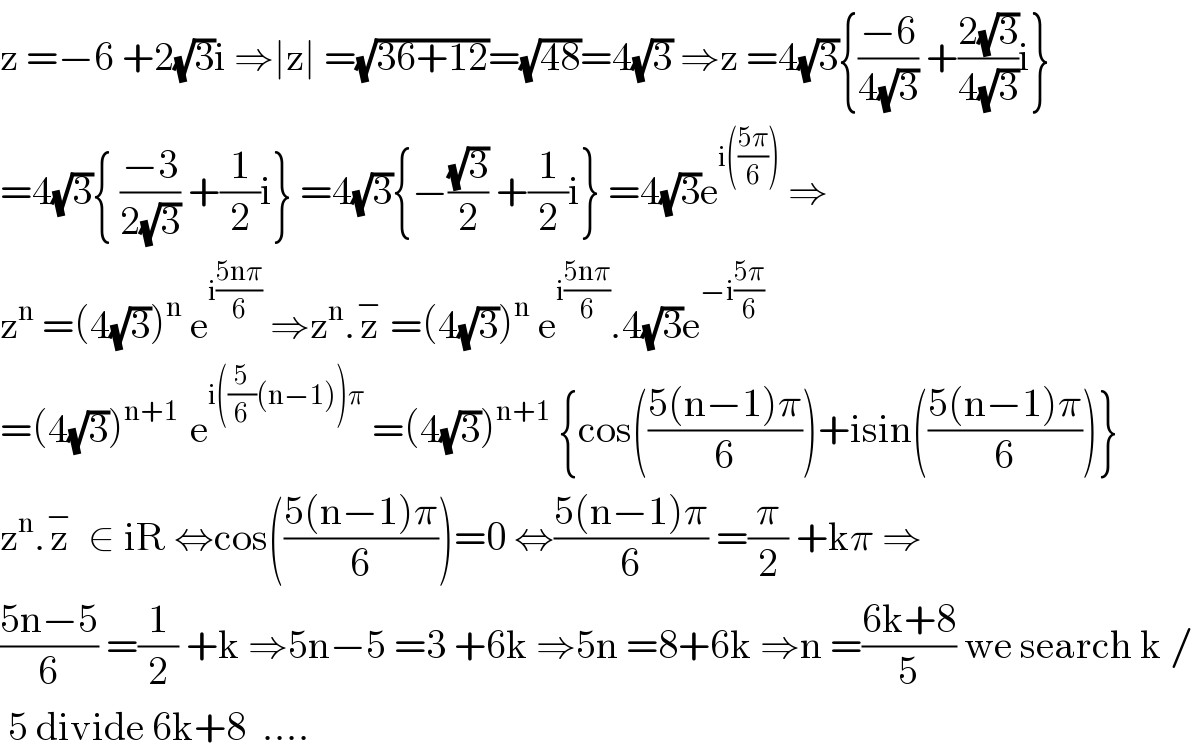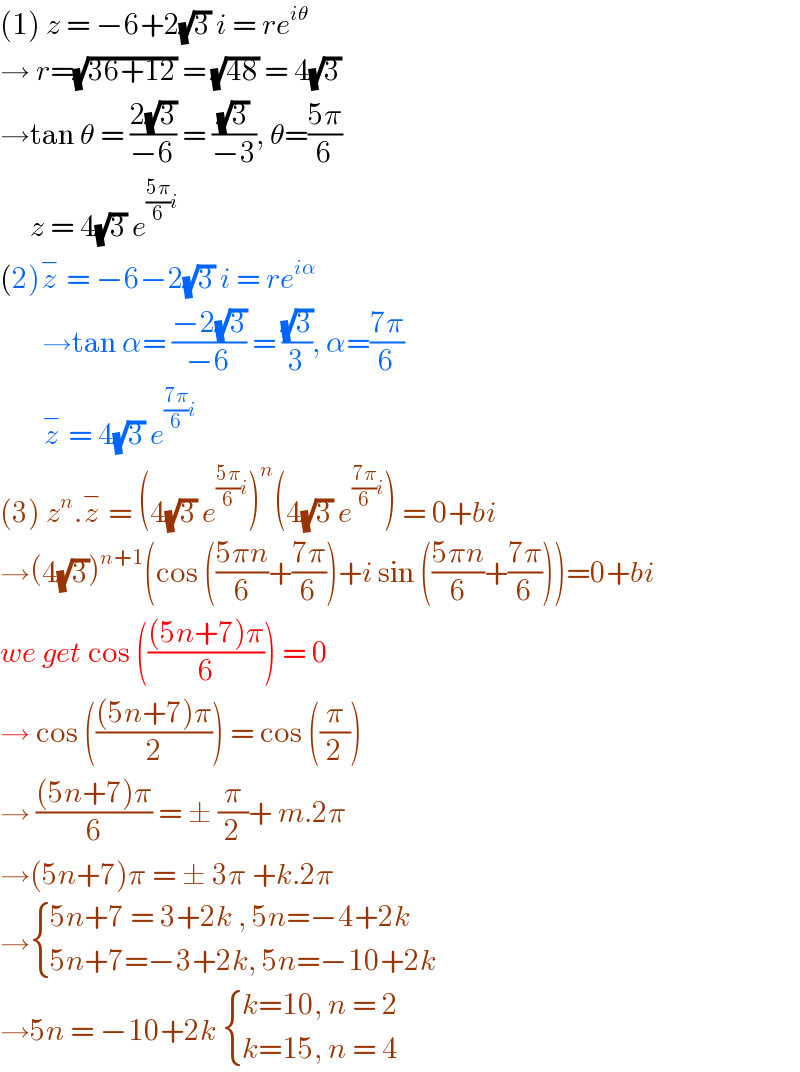
Question Number 112737 by bemath last updated on 09/Sep/20

$$\mathrm{Given}\:\mathrm{z}=−\mathrm{6}+\mathrm{2}\sqrt{\mathrm{3}}\:\mathrm{i} \\ $$$$\mathrm{find}\:\mathrm{the}\:\mathrm{two}\:\mathrm{least}\:\mathrm{value}\:\mathrm{of}\:\mathrm{n}\:\mathrm{such} \\ $$$$\mathrm{that}\:\mathrm{z}^{\mathrm{n}} .\overset{−} {\mathrm{z}}\:\mathrm{purelly}\:\mathrm{imaginary}. \\ $$
Commented by bemath last updated on 09/Sep/20

$$\mathrm{thank}\:\mathrm{you}\:\mathrm{both}\:\mathrm{sir} \\ $$
Answered by mathmax by abdo last updated on 09/Sep/20

$$\mathrm{z}\:=−\mathrm{6}\:+\mathrm{2}\sqrt{\mathrm{3}}\mathrm{i}\:\Rightarrow\mid\mathrm{z}\mid\:=\sqrt{\mathrm{36}+\mathrm{12}}=\sqrt{\mathrm{48}}=\mathrm{4}\sqrt{\mathrm{3}}\:\Rightarrow\mathrm{z}\:=\mathrm{4}\sqrt{\mathrm{3}}\left\{\frac{−\mathrm{6}}{\mathrm{4}\sqrt{\mathrm{3}}}\:+\frac{\mathrm{2}\sqrt{\mathrm{3}}}{\mathrm{4}\sqrt{\mathrm{3}}}\mathrm{i}\right\} \\ $$$$=\mathrm{4}\sqrt{\mathrm{3}}\left\{\:\frac{−\mathrm{3}}{\mathrm{2}\sqrt{\mathrm{3}}}\:+\frac{\mathrm{1}}{\mathrm{2}}\mathrm{i}\right\}\:=\mathrm{4}\sqrt{\mathrm{3}}\left\{−\frac{\sqrt{\mathrm{3}}}{\mathrm{2}}\:+\frac{\mathrm{1}}{\mathrm{2}}\mathrm{i}\right\}\:=\mathrm{4}\sqrt{\mathrm{3}}\mathrm{e}^{\mathrm{i}\left(\frac{\mathrm{5}\pi}{\mathrm{6}}\right)} \:\Rightarrow \\ $$$$\mathrm{z}^{\mathrm{n}} \:=\left(\mathrm{4}\sqrt{\mathrm{3}}\right)^{\mathrm{n}} \:\mathrm{e}^{\mathrm{i}\frac{\mathrm{5n}\pi}{\mathrm{6}}} \:\Rightarrow\mathrm{z}^{\mathrm{n}} .\overset{−} {\mathrm{z}}\:=\left(\mathrm{4}\sqrt{\mathrm{3}}\right)^{\mathrm{n}} \:\mathrm{e}^{\mathrm{i}\frac{\mathrm{5n}\pi}{\mathrm{6}}} .\mathrm{4}\sqrt{\mathrm{3}}\mathrm{e}^{−\mathrm{i}\frac{\mathrm{5}\pi}{\mathrm{6}}} \\ $$$$=\left(\mathrm{4}\sqrt{\mathrm{3}}\right)^{\mathrm{n}+\mathrm{1}\:} \:\mathrm{e}^{\mathrm{i}\left(\frac{\mathrm{5}}{\mathrm{6}}\left(\mathrm{n}−\mathrm{1}\right)\right)\pi} \:=\left(\mathrm{4}\sqrt{\mathrm{3}}\right)^{\mathrm{n}+\mathrm{1}} \:\left\{\mathrm{cos}\left(\frac{\mathrm{5}\left(\mathrm{n}−\mathrm{1}\right)\pi}{\mathrm{6}}\right)+\mathrm{isin}\left(\frac{\mathrm{5}\left(\mathrm{n}−\mathrm{1}\right)\pi}{\mathrm{6}}\right)\right\} \\ $$$$\mathrm{z}^{\mathrm{n}} .\overset{−} {\mathrm{z}}\:\:\in\:\mathrm{iR}\:\Leftrightarrow\mathrm{cos}\left(\frac{\mathrm{5}\left(\mathrm{n}−\mathrm{1}\right)\pi}{\mathrm{6}}\right)=\mathrm{0}\:\Leftrightarrow\frac{\mathrm{5}\left(\mathrm{n}−\mathrm{1}\right)\pi}{\mathrm{6}}\:=\frac{\pi}{\mathrm{2}}\:+\mathrm{k}\pi\:\Rightarrow \\ $$$$\frac{\mathrm{5n}−\mathrm{5}}{\mathrm{6}}\:=\frac{\mathrm{1}}{\mathrm{2}}\:+\mathrm{k}\:\Rightarrow\mathrm{5n}−\mathrm{5}\:=\mathrm{3}\:+\mathrm{6k}\:\Rightarrow\mathrm{5n}\:=\mathrm{8}+\mathrm{6k}\:\Rightarrow\mathrm{n}\:=\frac{\mathrm{6k}+\mathrm{8}}{\mathrm{5}}\:\mathrm{we}\:\mathrm{search}\:\mathrm{k}\:/ \\ $$$$\:\mathrm{5}\:\mathrm{divide}\:\mathrm{6k}+\mathrm{8}\:\:.... \\ $$
Answered by john santu last updated on 09/Sep/20

$$\left(\mathrm{1}\right)\:{z}\:=\:−\mathrm{6}+\mathrm{2}\sqrt{\mathrm{3}}\:{i}\:=\:{re}^{{i}\theta} \\ $$$$\rightarrow\:{r}=\sqrt{\mathrm{36}+\mathrm{12}}\:=\:\sqrt{\mathrm{48}}\:=\:\mathrm{4}\sqrt{\mathrm{3}} \\ $$$$\rightarrow\mathrm{tan}\:\theta\:=\:\frac{\mathrm{2}\sqrt{\mathrm{3}}}{−\mathrm{6}}\:=\:\frac{\sqrt{\mathrm{3}}}{−\mathrm{3}},\:\theta=\frac{\mathrm{5}\pi}{\mathrm{6}} \\ $$$$\:\:\:\:\:{z}\:=\:\mathrm{4}\sqrt{\mathrm{3}}\:{e}^{\frac{\mathrm{5}\pi}{\mathrm{6}}{i}} \\ $$$$\left(\mathrm{2}\right)\overset{−} {{z}}\:=\:−\mathrm{6}−\mathrm{2}\sqrt{\mathrm{3}}\:{i}\:=\:{re}^{{i}\alpha} \\ $$$$\:\:\:\:\:\:\:\rightarrow\mathrm{tan}\:\alpha=\:\frac{−\mathrm{2}\sqrt{\mathrm{3}}}{−\mathrm{6}}\:=\:\frac{\sqrt{\mathrm{3}}}{\mathrm{3}},\:\alpha=\frac{\mathrm{7}\pi}{\mathrm{6}} \\ $$$$\:\:\:\:\:\:\:\overset{−} {{z}}\:=\:\mathrm{4}\sqrt{\mathrm{3}}\:{e}^{\frac{\mathrm{7}\pi}{\mathrm{6}}{i}} \: \\ $$$$\left(\mathrm{3}\right)\:{z}^{{n}} .\overset{−} {{z}}\:=\:\left(\mathrm{4}\sqrt{\mathrm{3}}\:{e}^{\frac{\mathrm{5}\pi}{\mathrm{6}}{i}} \right)^{{n}} \left(\mathrm{4}\sqrt{\mathrm{3}}\:{e}^{\frac{\mathrm{7}\pi}{\mathrm{6}}{i}} \right)\:=\:\mathrm{0}+{bi} \\ $$$$\rightarrow\left(\mathrm{4}\sqrt{\mathrm{3}}\right)^{{n}+\mathrm{1}} \left(\mathrm{cos}\:\left(\frac{\mathrm{5}\pi{n}}{\mathrm{6}}+\frac{\mathrm{7}\pi}{\mathrm{6}}\right)+{i}\:\mathrm{sin}\:\left(\frac{\mathrm{5}\pi{n}}{\mathrm{6}}+\frac{\mathrm{7}\pi}{\mathrm{6}}\right)\right)=\mathrm{0}+{bi} \\ $$$${we}\:{get}\:\mathrm{cos}\:\left(\frac{\left(\mathrm{5}{n}+\mathrm{7}\right)\pi}{\mathrm{6}}\right)\:=\:\mathrm{0} \\ $$$$\rightarrow\:\mathrm{cos}\:\left(\frac{\left(\mathrm{5}{n}+\mathrm{7}\right)\pi}{\mathrm{2}}\right)\:=\:\mathrm{cos}\:\left(\frac{\pi}{\mathrm{2}}\right) \\ $$$$\rightarrow\:\frac{\left(\mathrm{5}{n}+\mathrm{7}\right)\pi}{\mathrm{6}}\:=\:\pm\:\frac{\pi}{\mathrm{2}}+\:{m}.\mathrm{2}\pi \\ $$$$\rightarrow\left(\mathrm{5}{n}+\mathrm{7}\right)\pi\:=\:\pm\:\mathrm{3}\pi\:+{k}.\mathrm{2}\pi \\ $$$$\rightarrow\begin{cases}{\mathrm{5}{n}+\mathrm{7}\:=\:\mathrm{3}+\mathrm{2}{k}\:,\:\mathrm{5}{n}=−\mathrm{4}+\mathrm{2}{k}}\\{\mathrm{5}{n}+\mathrm{7}=−\mathrm{3}+\mathrm{2}{k},\:\mathrm{5}{n}=−\mathrm{10}+\mathrm{2}{k}}\end{cases} \\ $$$$\rightarrow\mathrm{5}{n}\:=\:−\mathrm{10}+\mathrm{2}{k}\:\begin{cases}{{k}=\mathrm{10},\:{n}\:=\:\mathrm{2}}\\{{k}=\mathrm{15},\:{n}\:=\:\mathrm{4}}\end{cases} \\ $$
